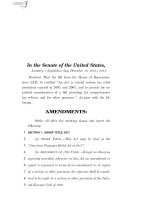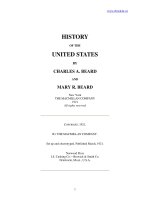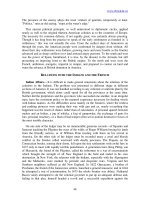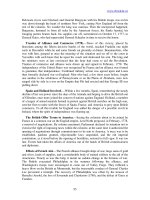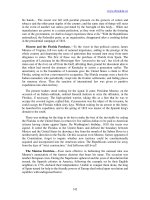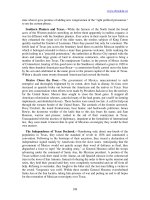American passages a history of the united states volume 1 to 1877 brief 4th edition ayers test bank
Bạn đang xem bản rút gọn của tài liệu. Xem và tải ngay bản đầy đủ của tài liệu tại đây (567.54 KB, 11 trang )
Chapter 1—Contact, Conflict, and Exchange in the Atlantic World to 1590
MULTIPLE CHOICE
1. Each of the following statements regarding the Maya is true except
a. they had a numerical system based on units of 10.
b. they utilized hieroglyphics.
c. they had a knowledge of astronomy.
d. they created several calendars.
e. they built cities of stone pyramids and temples.
ANS: A
REF:
p. 7
2. What was the capital city of the Aztec Empire?
a. Texcoco
b. Teotihuacán
c. Tenochtitlán
d. Tampico
e. Tijuana
ANS: C
REF:
p. 8
3. Pueblo Indians were descendants of which of the following?
a. Chaco
b. Anasazi
c. Hopi
d. Aztecs
e. Zuni
ANS: B
REF:
p. 8
4. Many of the Iroquois who resided in present-day New York State belonged to all but which of the
following tribes?
a. Mohawks
b. Apaches
c. Oneidas
d. Cayugas
e. Senecas
ANS: B
REF:
p. 9
5. Indian women who lived in the eastern woodlands engaged in all but which of the following?
a. raised corn, squash, and beans.
b. gathered nuts and fruit.
c. hunted and fished.
d. built houses.
e. made clothing.
ANS: C
REF:
p. 10
6. Shamans performed rituals to do which of the following in Native American society?
a. influence weather.
b. cure illness.
c. interpret dreams.
d. predict the future.
e. All of the above
ANS: E
REF:
p. 10
7. During the fifteenth century, monarchs consolidated national power in all but which of the following
countries?
a. Italy
b. Portugal
c. Spain
d. France
e. England
ANS: A
REF:
p. 10
8. Which of the following was the primary commodity affluent Europeans wanted from the East?
a. Spices
b. Teas
c. Rugs
d. Opiates
e. Coffee
ANS: A
REF:
p. 11
9. Prince Henry the Navigator of Portugal engaged or planned to engage in all but which of the
following?
a. challenge Arab hold on commerce with the East.
b. challenge Italian hold on commerce with the East.
c. promote trade with Africa.
d. spread Christianity.
e. All of the above
ANS: E
REF:
p. 11
10. New technologies used by the Portuguese to improve navigation and nautical warfare included which
of the following?
a. Lateen Sails
b. Astrolabe
c. Compass
d. Sonar
e. Quadrant
ANS: D
REF:
p. 11
11. Ghana, Mali, and Songhay were early empires in which region of the African continent?
a. Southern Africa
b. Eastern Africa
c. Northern Africa
d. Western Africa
e. Central Africa
ANS: D
REF:
p. 11
12. The following statements regarding West African cultures are accurate, except for which one?
a. Although influenced by Islam, they retained much of their traditional religions.
b. Slavery was present in the region before the Portuguese conquest.
c. Extended families were exclusively patrilineal.
d. Traditional African religions included a belief in a single all-powerful God and lesser gods
who could be either benevolent or harmful.
e. Polygyny was generally reserved to men of high status.
ANS: C
REF:
p. 13
13. Which of the following was a result of Portuguese involvement in the slave trade?
a. Portuguese merchants purchased slaves from Muslim traders and from Africans along the
coast.
b. The Portuguese colonized islands in the Gulf of Guinea.
c. The Portuguese developed the plantation system.
d. The Portuguese developed the commercial mechanism for purchasing slaves from Africa.
e. All of the above
ANS: E
REF:
p. 13-14
14. In 1455, the pope granted which nation a monopoly on the Atlantic slave trade?
a. Portugal
b. England
c. Spain
d. Italy
e. France
ANS: A
REF:
p. 14
15. The Treaty of Tordesillas called for which of the following?
a. A division of the world between the Spanish and the Portuguese on either side of a
demarcation line
b. An end to the ten-year war between Spain and Portugal
c. Outlawing of Spanish participation in the African slave trade
d. The replacement of King John of Portugal with Isabella and Ferdinand
e. Both A and B
ANS: A
REF:
p. 16
16. Ferdinand Magellan and Sebastian del Cano, along with their crew, became the first Europeans to
accomplish which of the following?
a. Circumnavigate the globe
b. Develop a profitable western sea route to Asia
c. Trade with the Native Americans
d. Find the elusive Northwest Passage
e. Both A and B
ANS: A
REF:
p. 17
17. The Spanish conquest of the New World was aided by which of the following?
a. Superior Spanish weaponry
b. The conquest of Mexico by Hernán Cortés
c. Impact of European diseases on the native population
d. None of the above
e. All of the above
ANS: E
REF:
p. 18
18. Which of the following transpired after remnants of the Narváez expedition survived violent storms in
the Gulf of Mexico, which caused many of their fellow Spaniards to be lost at sea?
a. The Spaniards were captured by the Karankawa Indians.
b. Narváez led a successful military offensive against the Karankawa Indians.
c. One of them, Cabeza de Vaca, lived among the Native Americans and later issued a report
about his journey to his fellow Spaniards.
d. Both A and C
e. Both B and C
ANS: D
REF:
p. 18
19. The Spaniards curtailed their exploration of much of North America by the 1540s primarily because of
which of the following developments?
a. They encountered numerous problems with Native American tribes.
b. They lost the financial backing of the Spanish court.
c. They feared the increasing number of intermarriages would pollute their race.
d. They failed to discover the gold and silver they desired.
e. A series of hurricanes destroyed their fleet.
ANS: D
REF:
p. 19
20. Which of the following is a result of what has come to be known as the Columbian Exchange?
a. Most surviving Native Americans accepted assimilation into Spanish culture, giving up
their own.
b. A huge number of Native Americans died, especially as a result of European diseases.
c. The Native Americans contributed numerous crops to European agriculture.
d. Both B and C
e. Both A and B
ANS: D
REF:
p. 19
21. When Native Americans accepted the Christian God as one of their many deities, they were practicing
which of the following?
a. Submission
b. Syncretism
c. Paganism
d. Pancretism
e. Assimilation
ANS: B
REF:
p. 20
22. Spanish colonial administration was hierarchical, with all but which of the following retaining some
political power?
a. Spanish Colonial Council
b. Audiencias
c. Governors
d. Viceroys
e. Caciques
ANS: A
REF:
p. 20
23. The Spanish mercantile system operated on what widely held assumption?
a. Nations had the right to trade with the colonies of other countries.
b. The primary goal of economic activity was a favorable balance of trade.
c. Colonists were under an obligation to build plantations and mines.
d. The slave trade would provide most of the money to run the Spanish colonial government.
e. Colonists were under no obligation to build plantations or mines.
ANS: B
REF:
p. 20
24. Which of the following was not a goal of the Spanish government in regard to Native Americans?
a. Convert them to Christianity.
b. Exploit their labor.
c. Take them to Spain as slaves.
d. Confiscate their wealth.
e. All of these were Spanish goals.
ANS: C
REF:
p. 20
25. Which of the following statements is false about the Spanish system of forced labor?
a. By the time the king outlawed most Native American slavery, the Arawaks of the West
Indies had been destroyed.
b. The encomienda system evolved from a labor system to one that gave Indian property to
colonists.
c. The Spanish turned to Africans to replace the rapidly decreasing supply of Native
American labor.
d. While large numbers of Native Americans had died due to harsh working conditions and
diseases, the African slaves proved immune to those factors.
e. Both B and D are false.
ANS: D
REF:
p. 21
26. Martin Luther challenged which of the following practices and tenets of the Roman Catholic Church?
a. Belief that salvation resulted from good works.
b. The sale of indulgences.
c. Belief that only priests could interpret the Bible.
d. None of the above
e. All of the above
ANS: E
REF:
p. 22
27. Followers of which of the following religious/political leaders became known variously as Huguenots,
Puritans, Presbyterians, and Reformed?
a. Martin Luther
b. Jonathan Edwards
c. John Calvin
d. Henry VIII
e. Ulrich Zwingli
ANS: C
REF:
p. 22
28. Henry VIII broke with the Roman Catholic Church because he
a. believed that Martin Luther professed the true faith.
b. did not want his children to be raised as Catholics.
c. desired an annulment so that he could marry again.
d. resented sending part of his country's wealth to Rome in tithes.
e. caught his Catholic wife in an adulterous relationship.
ANS: C
REF:
p. 22
29. England demonstrated its naval superiority in 1588 with the defeat of
a. the Spanish Armada off the coast of England.
b. the Dutch Navy in the North Atlantic.
c. Portuguese naval forces off the coast of India.
d. the Spanish Armada off the west coast of Africa.
e. the Dutch Navy off the southern coast of Africa.
ANS: A
REF:
p. 23
30. Where was the settlement that later became known as the Lost Colony located?
a. Roanoke
b. Croatoan Island
c. St. Augustine
d. Hispaniola
e. Jamestown
ANS: A
REF:
p. 23
31. Which of the following naval accomplishments was the first to occur?
a. Columbus crossed the Atlantic and landed at San Salvador.
b. Magellan's expedition circumnavigated the world.
c. Dias rounded Africa's Cape of Good Hope.
d. Da Gama reached India by sea.
e. Both A and C occurred in the same year.
ANS: C
REF:
p. 15
32. Which of the following statements is factually correct?
a. The Hohokam developed a series of large earthen burial mounds in the Mississippi River
valley.
b. The Aztecs settled in the Valley of Mexico about 1200 a.d.
c. The Mayan civilization reached its height about 1200 a.d.
d. The Hopewell built irrigation canals in the Southwest region of North America.
e. All of the above are factually correct.
ANS: B
REF:
p. 7-8
33. Which of the following events occurred last?
a. John Calvin became a powerful influence on the English Puritans.
b. Henry VIII broke away from the Roman Catholic Church.
c. The first European settlement at Roanoke Island was established.
d. Martin Luther launched the Protestant Reformation.
e. Both B and C occurred in the same year and were the last of the above events.
ANS: C
REF:
p. 22-23
34. French Huguenots attempted to establish which of the following settlements?
a. Roanoke Island
b. Charlesfort
c. Jamestown
d. Fort Caroline
e. Both B and D
ANS: C
REF:
p. 23
35. Which of the following chronologies of cultures in the Americas is correct?
a. Aztec, Mayan, Adena-Hopewell, Hohokam
b. Adena-Hopewell, Mayan, Hohokam, Aztec
c. Adena-Hopewell, Hohokam, Aztec, Mayan
d. Mayan, Adena-Hopewell, Aztec, Hohokam
e. Hohokam, Mayan, Adena-Hopewell, Aztec
ANS: B
REF:
p. 7-8
TRUE/FALSE
36. Over the course of four centuries, Africa lost more than 100 million people to the Atlantic slave trade.
ANS: F
REF:
p. 3
37. The European explorer who first touched the coast of Brazil and led to its being claimed by his country
was Pedro Álvares Cabral.
ANS: T
REF:
p. 16-17
38. The European disease that ravaged the Aztec population in the early 1500s was chicken pox.
ANS: F
REF:
p. 18
39. In 1540, Vasquez de Coronado led an expedition into the American Southwest, where they located the
famed Seven Cities of Cibola, known for their vast wealth in gold.
ANS: F
REF:
p. 18
40. As part of the Columbian Exchange, the white potatoes of South America became a staple crop in
northern Europe.
ANS: T
REF:
p. 19
41. The highest Spanish governing officials who actually resided in America were the viceroys.
ANS: T
REF:
p. 20
42. The mines at Potosi and Zacatecas were noted for their rich yield of gold.
ANS: F
REF:
p. 21
43. The repartimiento system was a method of forcing native Indians to labor for the Spanish.
ANS: T
REF:
p. 21
44. The encomienda was a document Spanish explorers were required to read to natives when they first
entered an Indian town, demanding they accept the Catholic faith and Spanish rule.
ANS: F
REF:
p. 21
45. Sir Francis Drake made his fortune through piracy.
ANS: T
REF:
p. 23
SHORT ANSWER
46. Identify: Indian corn; one of the first crops domesticated by natives of Mexico and Guatemala
ANS:
maize
REF: p. 7 | p. 19
47. Identify: Native American religious leaders believed capable of curing illness, interpreting dreams,
bringing good weather, and predicting the future
ANS:
shamans
REF: p. 10
48. Identify: Fifteenth-century Portuguese leader who fostered trade and exploration
ANS:
Prince Henry the Navigator
REF: p. 11
49. Identify: The most successful type of Portuguese ship, it was a square-rigged vessel with added lateen
(triangular) sails that increased its speed and maneuverability
ANS:
caravel
REF: p. 11
50. Identify: Pope Alexander VI's line of demarcation (1494), which gave new lands east of the line to
Portugal and west of the line to Spain
ANS:
Treaty of Tordesillas
REF: p. 16
51. Identify: Portuguese explorer for Spain, he led the expedition that eventually circumnavigated the
globe in the early 1500s
ANS:
Ferdinand Magellan
REF: p. 17
52. Identify: Spanish explorer who conquered the Aztecs of Mexico in 1519
ANS:
Hernán Cortés
REF: p. 18
53. Identify: Instigated by European explorers, this process introduced new foods, diseases, and
technology to the Americas from Africa and Europe, and vice versa, with a resultant blending and
exchange of cultures
ANS:
Columbian Exchange
REF: p. 19
54. Identify: Trading house in Seville, Spain, that regulated early commerce in the Americas
ANS:
Casa de la Contratación
REF: p. 20
55. Identify: System of labor established by the Spanish to obtain labor from native groups for minimal
cost
ANS:
encomienda
REF: p. 21
56. Identify: German monk whose public critique of the Roman Catholic Church launched the Protestant
Reformation
ANS:
Martin Luther
REF: p. 22
57. Identify: Movement begun in Europe to reform the Roman Catholic Church, which eventually evolved
into completely new interpretations of Christianity
ANS:
Protestant Reformation
REF: p. 22
58. Identify: Frenchman who brought the Reformation to Geneva, Switzerland, and who was most
responsible for the spread of Protestantism
ANS:
John Calvin
REF: p. 22
59. Identify: English seafarers and colonizers who expanded conquests from Europe to the Americas for
Elizabeth I; some of the most famous examples include John Hawkins, Frances Drake, and Walter
Raleigh
ANS:
sea dogs
REF: p. 23
60. Identify: English sea dog who twice attempted to establish a settlement at Roanoke, Virginia
ANS:
Walter Raleigh
REF: p. 23
ESSAY
61. Compare the culture of precontact Native Americans with that of postcontact Native American
cultures.
ANS:
Answers will vary.
REF: p. 8 | p. 20
62. Describe West African cultures as they existed at the time of the first contact with the Portuguese, and
explain the development of the Atlantic slave trade with the New World.
ANS:
Answers will vary.
REF: p. 11
63. Explain what the Spanish were searching for when Columbus came to the New World, how they
successfully conquered the area, and how the Native Americans reacted.
ANS:
Answers will vary.
REF: p. 15
64. Describe the colonial administration of Spain in the New World, and evaluate the effectiveness of its
system of checks and balances.
ANS:
Answers will vary.
REF: p. 19-20
65. Describe the main elements of the Columbian Exchange.
ANS:
Answers will vary.
REF: p. 19
66. Explain the significance of the Protestant Reformation to the development of settlement patterns in
America.
ANS:
Answers will vary.
REF: p. 22



